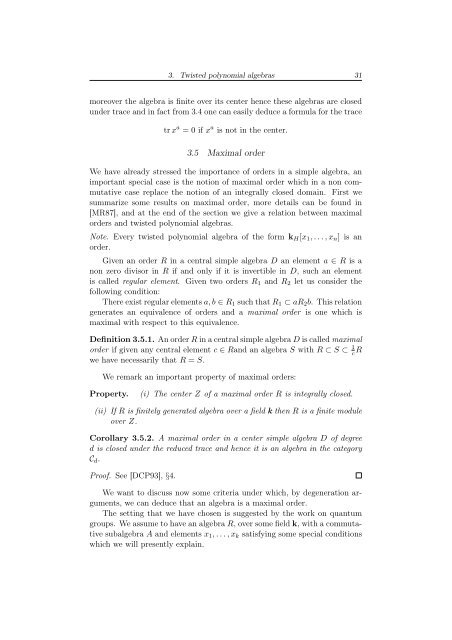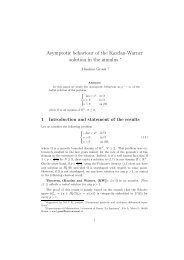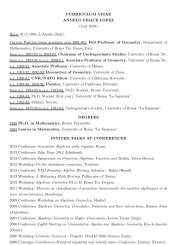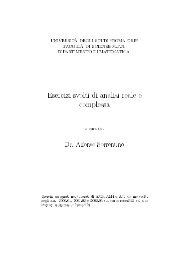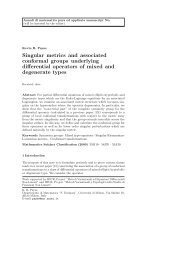Degree of Parabolic Quantum Groups - Dipartimento di Matematica ...
Degree of Parabolic Quantum Groups - Dipartimento di Matematica ...
Degree of Parabolic Quantum Groups - Dipartimento di Matematica ...
You also want an ePaper? Increase the reach of your titles
YUMPU automatically turns print PDFs into web optimized ePapers that Google loves.
3. Twisted polynomial algebras 31<br />
moreover the algebra is finite over its center hence these algebras are closed<br />
under trace and in fact from 3.4 one can easily deduce a formula for the trace<br />
trx a = 0 if x a is not in the center.<br />
3.5 Maximal order<br />
We have already stressed the importance <strong>of</strong> orders in a simple algebra, an<br />
important special case is the notion <strong>of</strong> maximal order which in a non commutative<br />
case replace the notion <strong>of</strong> an integrally closed domain. First we<br />
summarize some results on maximal order, more details can be found in<br />
[MR87], and at the end <strong>of</strong> the section we give a relation between maximal<br />
orders and twisted polynomial algebras.<br />
Note. Every twisted polynomial algebra <strong>of</strong> the form kH[x1, . . .,xn] is an<br />
order.<br />
Given an order R in a central simple algebra D an element a ∈ R is a<br />
non zero <strong>di</strong>visor in R if and only if it is invertible in D, such an element<br />
is called regular element. Given two orders R1 and R2 let us consider the<br />
following con<strong>di</strong>tion:<br />
There exist regular elements a, b ∈ R1 such that R1 ⊂ aR2b. This relation<br />
generates an equivalence <strong>of</strong> orders and a maximal order is one which is<br />
maximal with respect to this equivalence.<br />
Definition 3.5.1. An order R in a central simple algebra D is called maximal<br />
order if given any central element c ∈ Rand an algebra S with R ⊂ S ⊂ 1<br />
cR we have necessarily that R = S.<br />
We remark an important property <strong>of</strong> maximal orders:<br />
Property. (i) The center Z <strong>of</strong> a maximal order R is integrally closed.<br />
(ii) If R is finitely generated algebra over a field k then R is a finite module<br />
over Z.<br />
Corollary 3.5.2. A maximal order in a center simple algebra D <strong>of</strong> degree<br />
d is closed under the reduced trace and hence it is an algebra in the category<br />
Cd.<br />
Pro<strong>of</strong>. See [DCP93], §4.<br />
We want to <strong>di</strong>scuss now some criteria under which, by degeneration arguments,<br />
we can deduce that an algebra is a maximal order.<br />
The setting that we have chosen is suggested by the work on quantum<br />
groups. We assume to have an algebra R, over some field k, with a commutative<br />
subalgebra A and elements x1, . . .,xk satisfying some special con<strong>di</strong>tions<br />
which we will presently explain.


